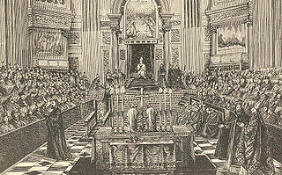
A Manual Of Councils Of The Holy Catholic Church -Rev. Edward H. Landon. M.A.
APPENDIX III: ON THE FORMS OBSERVED IN THE CELEBRATION OF COUNCILS
ECCLESIASTICAL Synods were usually held in churches; and it was customary early on the morning of the assembling of the council, to exclude every one from the church, and to fasten all the doors except one for the admission of the bishops.
At the time appointed the latter began to arrive in their pontifical vestments, and took their seats in a circle according to seniority, reckoning from the date of their consecration; after which the priests who were deputed to attend for absent bishops, or who had been called to the council, were admitted; the latter to seats behind the bishops, but the former sat upon the same seats with them. Frequently some of the order of deacons were present; these were not permitted to sit, but stood during the proceedings in front of the prelates. Notaries also attended to expedite the business of the synod.
All having taken their respective places, and the volume of the Holy Gospels and that of the canons of the Church being placed on a raised stand in the midst of the assembly, as soon as silence was obtained, an archdeacon, with a loud voice, exclaimed, “Let us pray;” upon which all present fell on their knees, and the president or one of the senior bishops offered up a prayer to God, that He would send the Holy Spirit to illumine them and guide them in their proceedings; and frequently litanies and the hymn “Veni, Creator,” were sung. As soon as the prayers were concluded, and the archdeacon had directed them to “arise,” all again took their seats in silence, and a deacon, vested in the alb, recited at the command of the president, the canons and regulations relating to the order to be observed in such assemblies; by which, amongst other things, it was enacted, that any one disturbing the synod by noise, or quarrelling, or laughter, should be quietly removed, and placed for three days under sentence of excommunication. The fourth canon of fourth council of Toledo is the chief authority upon this subject. This done, the matters to be considered by the council were declared, and the president addressed the assembly, exhorting them peaceably and faithfully to apply themselves to the discussion of the questions about to be brought before them.
Usually these questions were introduced in the following order:—First, those relating to the faith; secondly, those relating to morality; and, lastly, those which concerned the discipline of the Church. In examining these questions the fathers had recourse to the advice and opinions of theologians, lawyers, and learned clerks of whatever degree, who could assist them in arriving at a right conclusion; and in cases relating to heresy, or any other crime, the parties accused were introduced, and permitted to plead their own cause. After any matter had been thus sufficiently canvassed and each bishop, beginning at the president, had had an opportunity of delivering his opinion, the conclusion was pronounced by the president according to the majority of suffrages. Nor was it allowed to any prelate, under pain of excommunication, to withdraw until the whole was concluded.
The same order was observed during the other sessions.
The constitutions and decrees which had been agreed to in the council, having been revised and reconsidered in private congregation, were again, at the last session, publicly read through, and put to the suffrages of the fathers. After which each bishop subscribed the acts of the council, and occasionally, with the consent of the prelates, the priests and laymen present also signed; and prayer having been offered up for God’s blessing upon their enactments, and for His pardon for all their deficiencies, the archdeacon exclaimed, “In Nomine Domini nostri Jesu Christi eamus cum pace,” whereupon all except the president arose, and having given to each other the kiss of peace, beginning at the president, the synod was dissolved.
Frequently a fast of three days was ordered to be observed immediately preceding the opening of the council—J. B. Lavocat, Tractatus de Conciliis.
Copyright ©1999-2023 Wildfire Fellowship, Inc all rights reserved

 Keep Site Running
Keep Site Running